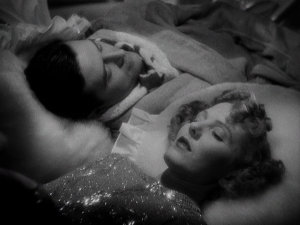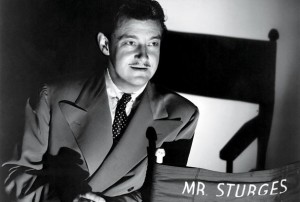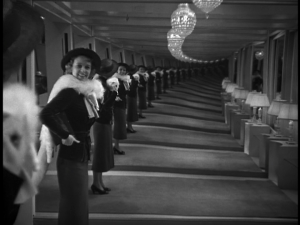To this day, Preston Sturges remains one of the most celebrated screenwriters in American film history. His clever dialogue and ridiculous antics took the screwball comedy genre to a new level. In addition to writing, Sturges began directing his own films in 1940 with The Great McGinty. His career spanned more than twenty years and he managed to leave a lasting impression on Hollywood.
This summer, I had the opportunity to work with Professor Sarah Kozloff on the first academic anthology ever published by Sturges. As an editor, Professor Kozloff was responsible for editing drafts from contributing writers, preparing photographs for the publisher, and establishing a consistent writing style for the book. To assist in the editing process I kept track of information on each chapter and made a style sheet. I also captured screenshots from several of Sturges’s films and edited them in Photoshop for the best print quality.
In addition to editing the anthology, Professor Kozloff also contributed two chapters. The first chapter discusses Sturges’s strength as a writer compared to his directing ability. Professor Kozloff argues that while Sturges enjoyed the control that came with directing his own screenplays, many of his films ultimately benefited from the influence of other directors. In the second chapter, Professor Kozloff explores Sturges’s influence on later filmmakers. She pays special attention to Ethan and Joel Coen who have previously acknowledged Sturges as one of their inspirations. Their 2000 film O Brother, Where Art Thou? took its title from the film-within-a-film in Sturges’s Sullivan’s Travels (1941) and Catherine Zeta-Jones’s character in Intolerable Cruelty (2003) bears a strong resemblance to the cunning heroines of films like The Lady Eve (1941).
To aid Professor Kozloff in the writing process, I conducted extensive research on each of the films discussed. This included finding books and periodicals in the Vassar library and making use of many online resources. Databases like WorldCat, Media History Digital Library, and EBSCOhost allowed me to find scholarly articles and film reviews that provided useful information. In addition, I was able to view Production Code documents on Sturges’s films on microfilm. I learned a great deal about the academic writing and researching processes. Once published, I have no doubt that the anthology will prove to be an important contribution to the world of film scholarship. I am extremely grateful to have received the opportunity to participate in such a fascinating project.



